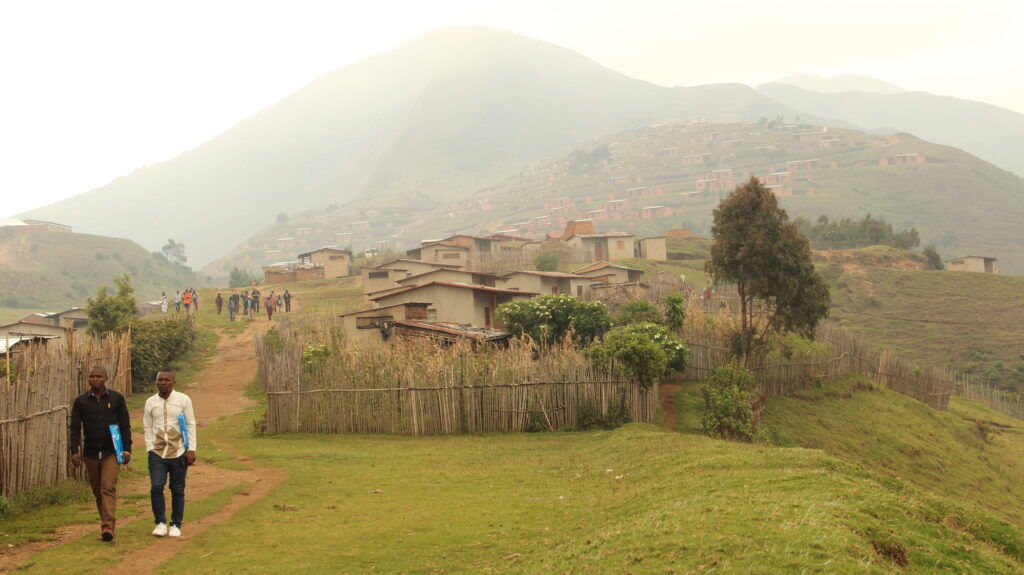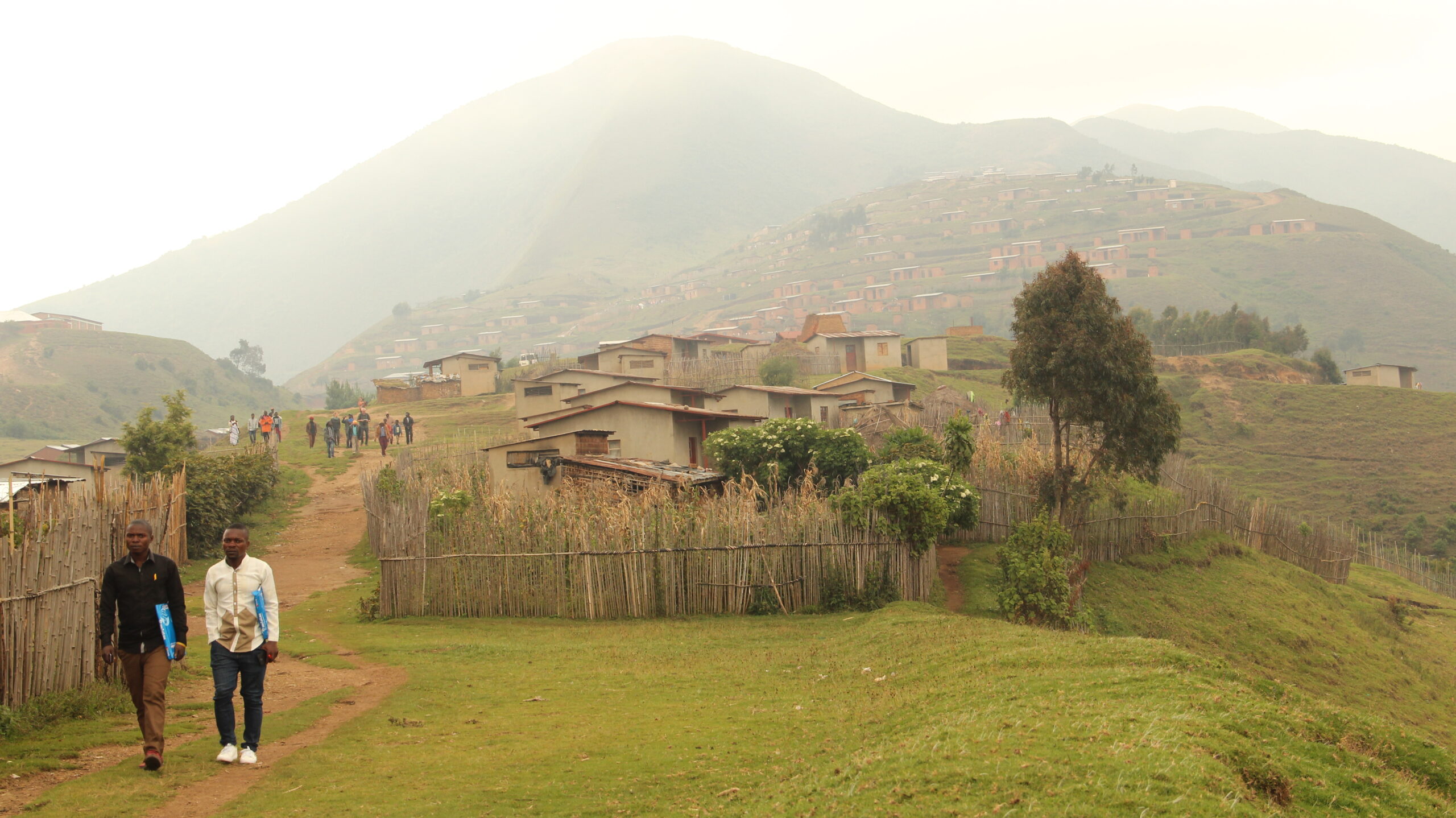
In 2010, following the opening of a gold mine, 283 households were relocated by the Canadian multinational Banro to a new village created from scratch called Cinjira, approximately 90 km from Bukavu in South Kivu, at Eastern Democratic Republic of Congo. Located at an altitude of 2900m, the village has no water, electricity or arable land. In 2019, more than 350 households survived in this hostile environment. Justice and Peace met them.
“We deplore 14 deaths in the month of May,” says Sister Espérance of the Bukavu Justice and Peace Commission. This organization has been fighting for years to ensure that the rights of populations impacted by the arrival of the Banro multinational, now bought by the Chinese company Baiyin.
The story is not new. Already in 1995 Banro showed his interest in the gold concessions of South Kivu belonging to the company SOMINKI [1]Held at 72% by the Belgian financial group Empin and at 28% by the Congolese state. at the time. SOMINKI became SAKIMA in 1997 during a process whose irregularities some observers noted [2]Socio-economic and environmental impact of industrial mining on mining communities in South Kivu, Justice pour Tous asbl, 2015, p. 19.. BANRO became the majority shareholder at 93%; the State disposed of the rest. Following an administrative and legal error committed by former President Laurent Désiré Kabila against SAKIMA, Banro seized an International Court and demanded 1 billion dollars from the Congolese State. In 2001, Banro proposed an arrangement to his successor Joseph Kabila: the transfer of the mining concessions of the former SOMINKI (equivalent to the area of 1/4 of Belgium) in exchange for the cancellation of the debt. Joseph Kabila accepted. To exploit the gold deposits, Banro created 4 subsidiaries including Twangiza Mining, the sector in charge of exploiting the deposit at the foot of the village of Cinjira, in the chiefdom [3]Une chefferie est une entité politique et administrative représentant des communautés territoriales sur un territoire limité à base régionale, soumise à la domination d’un chef dont … Continue reading from Luhwindja. Following an exploration phase, the first ingot was produced in November 2011.
The arrival of the Banro company was received in a mixed way by the population. Artisanal gold mining represented 30% of the economic activities of the population of the chiefdom – employing between 6,000 and 12,000 diggers – and was threatened by the arrival of Banro. The company effectively became the owner of all the mining concessions and was able to fire the diggers. The Canadian company, as is common in this type of case, was able to be very convincing with the population, promising jobs and development. The stakeholders (chiefdom, company, artisanal operators) sat around the table to draw up specifications setting out the company's commitments: obligation of employment at local level, improvement of access to education and health, revitalization of the local economy, etc. “To date, only 21% of the specifications have been executed,” complains a representative of the Luchiga group, a community near the mine. With the cessation of artisanal extraction activities, the money which circulated through these activities and supported the local economy became concentrated in few hands. The diggers, and the population in general, became considerably poorer.
To carry out its operations, 283 households had to be relocated in 2010, a first wave of the 800 relocations planned throughout the project. The population repeatedly expressed their dissatisfaction with this project. The company's methods for carrying out the relocation were denounced by several residents. Those most reluctant to move were victims of intimidation and attacks by the police. Several were even imprisoned. To meet its commitments to consult the population regarding their relocation, the company met with community representatives. The latter, desperate and no longer knowing how to express their refusal to leave the premises, offered the company an absurd location – the summit of a neighboring mountain that is difficult to access and has a very harsh climate – thinking that the company would never succeed in Try the challenge. Yet Banro achieved the impossible.
Getting to Cinjira takes a long time. On the road, we stop in Bijaga, the village of the second wave of people displaced in 2017. The mistakes made in Cinjira do not seem to have served as a lesson to Banro. New constructions rarely exceed 15m2, where entire families are sometimes crammed together. On the hillside, they do not have cultivable land or electricity. At least at this altitude, unlike Cinjira, the climate is bearable. But the residents are disappointed with their new living environment, some have even fled further away, to relatives or to Bukavu.
We continue our journey and discover the immense open-air mine. These apocalyptic landscapes are striking in their gigantism. The hole is gradually eating away at the mountain and gradually swallowing up the houses. We observe occupied homes on the edge of mining operations, whose life is punctuated by daily explosions. In Kantanbwe, there is no longer even a way to fetch water. The residents ask to be relocated but Banro cites a lack of resources.
Our ascent to Cinjira follows. Arriving at the top of the mountain, the cold and the wind are felt. However, the residents we meet are lightly dressed, most of them barefoot in flip-flops. They completely clash with this rather Andean climate. Many of the children we pass by are coughing and seem ill. We go to the dispensary where we meet the 21-year-old nurse. The doctor only comes by from time to time. “10 to 15 new cases arise per day. We cannot treat everyone, we lack resources. People mainly suffer from pneumonia, gastroenteritis, diarrhea. The children also suffer from malnutrition,” she tells us. His keen personal investment, however, is not up to the village's health challenges. Outside, a sick child and his father sit on the grass waiting for treatment. The father tells us he doesn't know where to go. We will learn a few weeks after our return that this child died because he could not be taken care of.
We then cross the village accompanied by the chef and visit one of the tiny houses built by the company. 3 rooms of 15m2 accommodate a family of 6 people, sometimes more. The poorly fired bricks are damp and crumbling, the houses are cracked. Each family tries to cultivate on the few square meters of garden that have been allocated to them. Most people have severe nutritional deficiencies.
The majority of people here don't have a job. Cinjira is so isolated that you have to walk for hours to reach the nearest village or fetch drinking water. Some people work for Banro, but these jobs are not stable. Recently, with the resale of Banro to Chinese investors, several workers lost their jobs.
Many of Banro's promises have not been kept to the people of Cinjira. “We were promised very nice houses, drinking water, a nice clinic, schools, satisfaction of our needs, jobs, electricity, but nothing was done. » tells us the village chief.
Below is the Banro gold processing plant. Modern infrastructures where cyanidation is practiced, a practice which consists of using cyanide, a toxic product, to isolate the gold from the rest of the extracted stone. A large amount of water is required. Residents also complain about the drying up of several sources. The dirty water is then poured into an unprotected artificial lake. Animals and birds have died there after drinking the water. Information and prevention of these dangers do not take place. Independent environmental impact studies are also sorely lacking. Banro had drawn up one at the time which had to be revised every 2 years. It's been 8 years since she was.
On the side of public authorities, the deputy of the Minister of Mines of Bukavu whom we met is trying to temporize the situation. He evokes the new mining code which will bring in more funds for the development of the population. He also explains that the populations are trying to trap the company: “the communities trap the company by putting themselves right next to the farm, building new houses and not going to the houses built for them. They want double compensation.” What civil society firmly denies.
At the regional level, Justice and Peace Bukavu fights tirelessly so that the population of Cinjira benefits from a dignified life: round table with representatives of the company, authorities and communities, advocacy at different levels or even the provision of equipment to families. But the changes are minor and the population continues to die slowly. “Until now, we have favored mediation but if that fails, we will take legal action. We are convinced that legal action can influence,” says Sister Espérance of the Diocesan Justice and Peace Commission.
Other international actors have also spoken out about these injustices. In 2015, Vincent Georis of the Echo published his report “ On the trail of blood ores » where he spoke of the dramatic situation of Cinjira, following a mission with Justice and Peace. The interview with Buhenda Bugiri, the last resistance fighter from the original village who refused to be relocated and demanded compensation commensurate with the value of his property, had had positive repercussions, we learned during our passage in June 2019. Milo Rau’s film “ The Congo tribunal » produced in 2017 features a fictional court where everything is true and talks about Cinjira. Or the book “Black Canada. Looting, corruption and crime in Africa” by Alain Deneault which earned the publishing house ecosociété legal action for having denounced the practices of Canadian companies including Banro.
Could legal action have any effect? What remedies are available for such human rights violations by a company? And what criminal liability for a transnational company like Banro with multiple subsidiaries around the world? The impunity of Banro in Cinjira once again pleads for the creation ofa binding treaty requiring companies to respect human rights. This treaty has been under negotiation at the UN Human Rights Council since 2014, within an intergovernmental working group. If the European Union appears to be a great promoter of the United Nations Guiding Principles relating to business and human rights proposed by John Ruggie [4]Special Representative of the Secretary-General of the United Nations on the issue of human rights, transnational corporations and other businesses between 2005 and 2011. (Protect, Respect, Repair) and adopted in 2011, it however completely lacks a constructive attitude in the debates on the binding treaty. In March 2019, the European Union declared that it would attend without formally participating in the next negotiating session scheduled for October, despite the support of the European Parliament for this process.
The case of Cinjira is yet another sad example of the priority given to economic interests over human life. The Congolese state should be able to be intransigent towards this type of behavior and not complacent when it comes to investments by large economic players. Faced with the rise of multinationals in our globalized society, it is essential that the States of all countries make human rights prevail over economic interests, otherwise the logic of profit of these financial giants continues to be deployed at the expense of our planet and its inhabitants. Justice and Peace and its partner networks will continue to denounce these practices and put pressure on our leaders in this direction.
Geraldine Duquenne.
Attachments
Notes[+]
| ↑1 | Held at 72% by the Belgian financial group Empin and at 28% by the Congolese state. |
|---|---|
| ↑2 | Socio-economic and environmental impact of industrial mining on mining communities in South Kivu, Justice pour Tous asbl, 2015, p. 19. |
| ↑3 | Une chefferie est une entité politique et administrative représentant des communautés territoriales sur un territoire limité à base régionale, soumise à la domination d’un chef dont l’autorité ne repose plus uniquement sur la parenté (à la différence du clan), mais également sur le prestige, le sacré, une certaine coercition limitée. |
| ↑4 | Special Representative of the Secretary-General of the United Nations on the issue of human rights, transnational corporations and other businesses between 2005 and 2011. |







